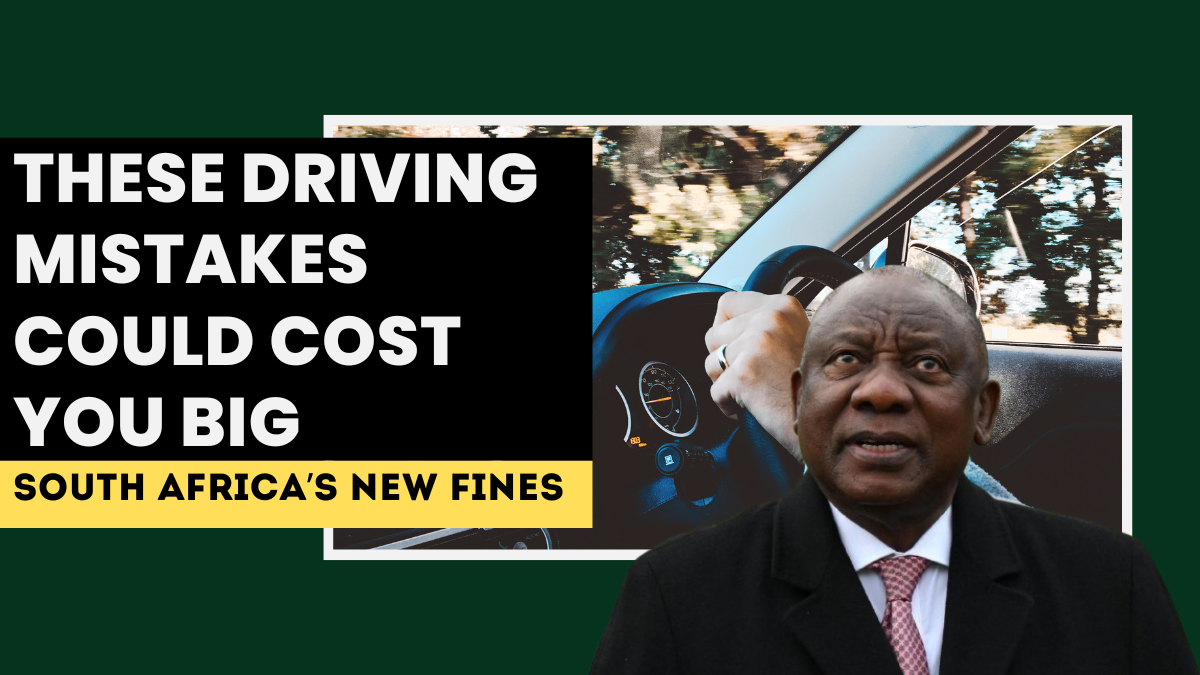South Africa has rolled out major updates to its road rules in 2025, introducing a stricter penalty system with heavier fines for common violations. These changes, announced by the Road Traffic Infringement Agency (RTIA), are designed to curb reckless driving, improve road safety, and reduce the number of accidents nationwide. With traffic fatalities remaining a serious issue, the government hopes that higher fines will encourage drivers to adopt safer habits behind the wheel.

Why Road Fine Updates Were Needed
Road safety has been one of South Africa’s biggest challenges, with thousands of lives lost every year due to reckless driving, speeding, and failure to comply with road laws. Despite awareness campaigns, offences such as texting while driving, drunk driving, and ignoring traffic signals remain widespread.
The 2025 fine structure was introduced to close loopholes, enforce stricter compliance, and bring South Africa in line with international standards. Authorities believe that making penalties more severe will act as a deterrent and ultimately reduce road fatalities.
Key Offences and Their Fines in 2025
The new road rules introduce a broad list of offences with updated penalties. Some of the major fines include:
-
Speeding: Drivers caught exceeding the speed limit by more than 20 km/h face fines of up to R3,000, while excessive speeding over 40 km/h can lead to higher penalties and possible license suspension.
-
Drunk Driving: Driving under the influence now carries fines of up to R5,000, with repeat offenders facing imprisonment.
-
Distracted Driving: Using a mobile phone while driving can result in fines of R2,500.
-
Failure to Wear Seatbelts: Both drivers and passengers face fines of R1,000 per person for not wearing seatbelts.
-
Ignoring Traffic Lights: Running a red light can now cost drivers R2,000.
-
Overloading Vehicles: Commercial drivers overloading vehicles may face fines of up to R4,000, depending on severity.
-
Unroadworthy Vehicles: Driving a vehicle deemed unroadworthy results in fines of R1,500 and possible impoundment.
These fines highlight the government’s focus on enforcing responsibility and addressing both individual drivers and commercial operators.
The Demerit System and RTIA Enforcement
Alongside the new fines, the Administrative Adjudication of Road Traffic Offences (AARTO) Act and its demerit system are being fully implemented in 2025. Under this system:
-
Drivers accumulate points for each offence.
-
Reaching 12 points results in automatic license suspension.
-
Repeat offenders risk permanent license cancellation.
This system makes penalties more than just financial, directly affecting driving privileges and ensuring accountability.
Impact on Drivers and Transport Companies
The updated fines affect not just private motorists but also public transport and freight companies. Taxi and bus operators, often under scrutiny for unsafe driving practices, will face stricter enforcement. Overloading fines in particular target commercial fleets, where safety violations can endanger dozens of lives at once.
Insurance companies may also adjust premiums for drivers with frequent fines or demerit points, making compliance with the law financially critical beyond immediate penalties.
How Drivers Can Stay Compliant
To avoid hefty fines under the new system, drivers are urged to:
-
Obey posted speed limits at all times.
-
Avoid using phones or devices while driving.
-
Ensure vehicles are roadworthy with up-to-date maintenance.
-
Never drive under the influence of alcohol or drugs.
-
Educate passengers about seatbelt requirements.
-
Stay informed of regional updates, as enforcement may vary across provinces.
By adopting safer driving practices, motorists can not only save money but also contribute to reducing road accidents.
Why These Changes Matter in 2025
South Africa has one of the highest road fatality rates globally, with accidents often linked to preventable behaviours. The 2025 fines represent a significant policy shift that prioritizes human life over convenience. By combining financial penalties with the demerit system, authorities are signaling that road safety is a national priority.
The measures also align with international best practices, bringing South Africa’s enforcement standards closer to those in countries with lower accident rates. For drivers, the changes are a reminder that responsible behaviour is no longer optional — it’s enforced by law.
Key Takeaways
The major fines under new SA road rules 2025 are a clear response to persistent road safety issues. With stricter penalties for speeding, drunk driving, distracted driving, and other violations, the government hopes to instill discipline and reduce accidents. The integration of the demerit system makes non-compliance even riskier, as repeated violations can lead to license suspension or cancellation.
For South African drivers, the message is simple: follow the rules, drive responsibly, and avoid costly mistakes that could affect both finances and safety.
FAQs
What is the fine for drunk driving in South Africa in 2025?
Drivers caught under the influence can face fines up to R5,000, with repeat offenders at risk of imprisonment.
How does the demerit system work?
Each traffic offence carries demerit points. Reaching 12 points results in license suspension, and repeat offences may lead to cancellation.
What happens if I am caught speeding?
Exceeding the limit by more than 20 km/h can cost up to R3,000, while going 40 km/h or more over the limit can lead to higher penalties and suspension.
Are seatbelts mandatory for all passengers?
Yes, both drivers and passengers must wear seatbelts. Fines of R1,000 per person apply for non-compliance.
Do the new fines apply to commercial drivers too?
Yes, commercial drivers, including taxis and trucks, face heavy fines for overloading, unroadworthy vehicles, and reckless driving.
Click here to know more.




